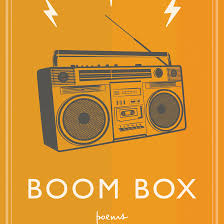ISSN: 1941-4137
POETRY THAT ENACTS THE ARTISTIC AND CREATIVE PURITY OF GLASS
POETRY THAT ENACTS THE ARTISTIC AND CREATIVE PURITY OF GLASS

Eric Lochridge is the author of three poetry chapbooks, most recently Born-Again Death Wish (Finishing Line Press, 2015). His poems have appeared in DIAGRAM, Slipstream, Ghost City Review, and many others, as well as anthologies such as WA 129 (Sage Hill Press, 2017) and Beloved on the Earth (Holy Cow! Press, 2009). He lives in Bellingham, Washington. Find him on Twitter @ericedits.
June 18, 2019
Edited by Stephanie Kaylor
Edited by Stephanie Kaylor
Review of Boom Box by Amorak Huey

Boom Box
Amorak Huey
Sundress Publications, 2019
At first glance, Boom Box (Sundress Publications, 2019), Amorak Huey's new poetry collection could be considered a kindred spirit to the Netflix series Stranger Things. The book and the show both are full of pop-culture touchstones from an eighties childhood. Music, film, and television references from the era appear in abundance. But where Stranger Things dives into the science fiction and fantasy land of The Upside Down, Huey delves into a cultural shift that was beginning to show its effects on society at the time. With the divorce rate hitting a historic high in 1980, the ideal of a happy, lifelong marriage had evaporated.
Through poems that call upon icons of the era such as Twisted Sister, Knight Rider, and Raiders of the Lost Ark, Boom Box frames a childhood marked by the stress of watching powerlessly as parents fumble their marriage. As he tosses out references to the Star Wars saga, KISS, and The A-Team, Huey weaves in tales of tension between parents and the slow disintegration of a family.
The first part of the book captures the confusion of a child trying to understand what's happening to his parents. The second part progresses through the isolation and frustration a disaffected teen feels trying to find his way to adulthood from unstable ground. For example, “Dead Man’s Float” comes early in the collection but after a series of poems that serve to outline the parents’ breakup. It shows a boy who is still hopeful:
Late summer, Cahaba River, practicing buoyancy
I am young enough to expect I will survive.
The erosion of love between parents is felt early in the collection as a thing that is happening in the present. Later in the collection, it feels like an event of the past. The poems turn decidedly darker, as in the sarcasm of “Crimes I Did Not Commit”:
I did not yell the word divorce
into my brother’s face until he cried
so I could paint my parents with his tears
The divorce theme is less pronounced in the second part of the book, but cynicism and frustration leave a palpable residue. “The Boys in the Parking Lot” looks back critically on adolescence, the “hiding under the table” of “Crimes I Did Not Commit” giving way to a “sleepless, swaggering summer”:
So hot that year
the blacktop still sticky at midnight
we angled our cars just so, and our bodies —
every move a pose
Readers who know Huey's previous collections will recognize the deft wit that has become his hallmark, as well as his knack for attention-grabbing titles. The humor and pop culture iconography combine to form a current of distraction that runs through Boom Box, a deflection from the heavier themes underpinning many of the poems. “Portrait of My Brother as Indiana Jones,” “Elegy for Dirty Dancing,” and “Dungeon Master’s Guide to Eighth Grade” all cut deeper than their titles let on.
The collection is bookended by two poems glaringly devoid of any pop culture references. “I Have Harnessed Myself Ridiculously to a House Three Miles Outside a Small Town in Alabama” and “Elegy for Where I Was Born” set not only the location but also the emotional landscape of the childhood events they sandwich. The opening poem’s first line, “Place is a kind of truth as walnut trees are a kind of tall,” and the closing poem’s final line, “To love a place is to leave it behind before/it ceases to exist,” show appropriate ambivalence.
Huey’s pop culture references serve as something like fun entry points into the poems, but they also are distractions from what was happening to and within the child. One can't help but think that kind of distraction is just what a boy growing up in proximity to the dissolution of his parents’ love would have sought out.
Visit Amorak Huey's Website
Visit Sundress Publications' Website
Glass: A Journal of Poetry is published monthly by Glass Poetry Press.
All contents © the author.
All contents © the author.





